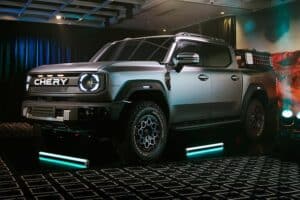Shark's claimed 0-100km/h time of 5.7 seconds is more than a second faster than that of the Raptor.

This is a debate that has been brewing since the announcement that the BYD Shark bakkie will come to South Africa.
The Chinese carmaker Build Your Dream made it very clear right from the get-go that it only had one prey in mind for the BYD Shark and that was the Ford Ranger Raptor. On paper, it would seem like the Shark has the Ranger Raptor beat hands down.
Two years ago, when The Citizen Motoring first got to drive the Ford Ranger Raptor, which included high-performance testing at altitude and at sea-level, I was left in no doubt that this Ford will not be beaten. Ever!
300kW bakkies in demand
Toyota was the first to laugh off the thought of using their 305kW/650Nm 3.5-litre V6 twin-turbo petrol engine from the Land Cruiser 300 to bring some GR Hilux hurt to the Ford Performance brand. As for the rest of the legacy brands, the likes of the Isuzu D-Max, Nissan Navara and Mitsubishi Triton simply slammed the door shut on such a ridiculous idea that anybody would need a 300kW bakkie.
How fast do you need to move people from A to B, or some sheep from farm to farm? But what they all underestimated, is how many people would want a 300kW bakkie. Ford SA sell its allocation of Ranger Raptors as fast they arrive.
ALSO READ: Sub-R1m BYD Shark becomes South Africa’s most powerful bakkie
The other thing nobody saw coming at the time, was that the Chinese were secretly eyeing up the Ford Ranger Raptor too and the BYD Shark is now the first of several 300kW bakkies rumoured to be on their way to enter this power war.
BYD Shark undercuts Raptor
The BYD Shark retails for R959 900, which makes it substantially cheaper than the R1 270 000 Ford Ranger Raptor. And the price of the Shark includes a 7kW wall charger, V2L socket, 2.2kW portable charger and a roll bar and tow bar. The last few will set you back extra if you opt for the Ranger Raptor.
Same, same, but different
The Shark is covered by a five-year/100 000km vehicle warranty and an eight-year/200 000km battery warranty. The Ford Ranger Raptor offers four-year/120 000km vehicle warranty. We could call this one a draw, but what might sway potential buyers is the difference in the service and maintenance plan offerings from BYD and Ford.

Service and maintenance
The BYD Shark comes standard with a five-year/100 000km full maintenance plan. Ford SA only recently included a six-year/90 000km service plan into the selling price of their vehicles. Which means that if you want a maintenance plan for your Ranger Raptor, you will need to purchase one.
BYD Shark ahead on power
Can they be the same in drive and feel? No chance, but for some, the power and torque numbers just might be the heart of the battle. And here the BYD Shark offers a better combined power output of 321kW and 650Nm from its 1.5-litre petrol engine, electric motor combination, The Ford Ranger Raptor’s 3.0-litre V6 twin turbo petrol engine produces 292kW and 583Nm.
ALSO READ: What R960k BYD Shark money can buy in other bakkie stables
Raptor’s title on the line
I don’t recall Ford SA ever officially releasing a claimed 0-100km/h time for their Ranger Raptor, but we got a time of 6.90 seconds when we tested the bakkie back in 2023.
Despite the Shark weighing in at 280kg heavier than the Ranger Raptor, at 2 710kg to 2 430kg, the superior power and torque numbers, and electrical assistance, still see BYD claiming that their bakkie can get to 0-100 km/h in a time of just 5.7 seconds. Which again on paper suggests that it will easily outrun the Ford in an on-road shoot-out. Throw some dirt in the mix, and the tables could well be comprehensively turned.
BYD Shark easier on the juice
What is not at all in dispute is that the Ford Ranger Raptor is going to hurt you at the filling station and in your pocket. We know this bakkie loves fuel as much as it does a dirt road. Ford claim a combined fuel consumption figure of 11.5-litres per 100km, but we averaged a crazy 17.6 litres per 100km when we had the Ranger Raptor on test.
BYD claim 9.6-litres per 100km for their Shark, and simple logic dictates that the more you make use of the 85km pure electric range from the battery, the less you will use fuel, and the lower you monthly running cost bill will be. Even when you factor in the price of electricity.
Support Local Journalism
Add The Citizen as a Preferred Source on Google and follow us on Google News to see more of our trusted reporting in Google News and Top Stories.






